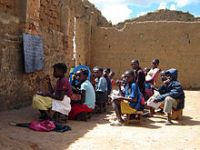UNICEF: Disparities in Children's Rights
UNICEF's latest data reveal disparities and show the need to innovate to promote children's rights. As we approach the 25th anniversary of the Convention on the Rights of the Child, much progress has been made, but to reach the unreached children, greater focus is needed on disparities.
New York , January 30, 2014 - By declaring today that "every child counts" , the United Nations Fund for Children (UNICEF) calls for innovations and greater efforts to identify and reduce the gaps that prevent the most disadvantaged children - between 2.2 billion boys and girls from around the world - from enjoying their rights.
In a report released on Thursday (30/1) , the agency that works on behalf of children emphasizes the importance of data so that we can move forward for the benefit of children and reveal the unequal access to services and protection that still prevails in the lives so many boys and girls.
"It was the data that made it possible to save and improve the lives of millions of children, especially the underprivileged," said Tessa Wardlaw, Chief of Data and Analyses of UNICEF. "We can only move forward if we know that children are the most neglected, where girls and boys are out of school, where diseases are increasing or where there is a lack of basic sanitation."
Huge progress has been made since the signing of the Convention on the Rights of the Child in 1989 and also in efforts towards the achievement of the Millennium Development Goals in 2015. The UNICEF report "World's Children 2014 Numbers" shows that:
- About 90 million children who would have died before reaching 5 years of age, if the child mortality rates had remained at the same level of 1990, were saved. Largely, this is due to progress made in the areas of immunization, health and water and sanitation services.
- Improvements in nutrition led to a 37% decrease in the occurrence of retarded growth since 1990.
- The primary school enrollment increased, even in less developed countries: whereas in 1990 only 53 out of every 100 children in these countries have access to school, in 2011 the number had risen to 81 in 100.
Nevertheless, the statistics of the report, titled "Every child counts: revealing disparities, promoting the rights of children", also provide evidence of continuing violations of children's rights:
- Approximately 6.6 million children under 5 died in 2012, mostly from preventable causes, a violation of their fundamental right to survive and develop .
- Fifteen percent of children worldwide are forced to work, which undermines their right to protection from economic exploitation and violates their right to learn and play.
- Eleven percent of girls marry before age 15, endangering their rights to health , education and protection.
The data also reveal gaps and inequalities, since the gains from development are unevenly distributed:
- The poorest children in the world are nearly three (2.7) times less likely than the richest to rely on skilled attendance at birth, which is required for their mothers and entails a higher risk of complications related to delivery.
- In Niger, all urban households have access to drinking water, but only 39 % of rural households have this benefit .
- In Chad, for every 100 boys who reach high school, only 44 girls achieve the same, which deviates from the formal education and the protections and services that schools can offer.
The report points out that "to be counted, the children become visible, and this act of recognition allows for their needs to be met and their rights implemented". It adds further that the innovations in the collection, analysis and dissemination of data allow disaggregation by factors such as their location, wealth, gender, ethnicity and presence of disabilities, including, in this way, children who have been excluded or ignored by broader measurements.
The report urges greater investment in innovation in order to correct these trends.
"Overcoming Exclusion begins with comprehensive data. To improve coverage, reliability and availability of data regarding the deprivation affecting children and their families the tools for collection and analysis are constantly being updated and new tools being developed. This requires commitment and sustained investment," the report states.
Much of what is known about the situation of children comes from household surveys, and in particular the Multiple Indicator Cluster Surveys - MICS. Developed and supported by UNICEF, the MICS are conducted by national statistical institutes and provide disaggregated data on numerous aspects that affect the survival and development of children, their rights and their life experiences. Until today, MICS were conducted in more than 100 countries. In the last round of MICS, interviews were conducted in over 650 thousand households in 50 countries.
Thirty years have passed since the report on the World's Children began publishing tables with standardized statistics, with global and national data, with the aim of providing a detailed picture of the situation of girls and boys. With the release of an edition of the report devoted specifically to the data, UNICEF calls on decision-makers and the general public to use these statistics (www.data.unicef.org) and thus act for positive change for children.
"The data, by itself, does not change the world. But the data make it possible to change, to identify needs, support advocacy and evaluate progress made. What really matters is that decision-makers use the data to make positive changes and that data are available for the use of children and communities to assert their rights against those responsible for compliance," the report says.
Agencies Broadcasting : A video report is available in https://weshare.unicef.org/mediaresources
To read the World 's Children 2014 Report Situation in Numbers - Every child counts : Revealing disparities , promoting the rights of children and to have access to other multimedia materials https://www.unicef.org/ sowc2014/numbers
For information about the MICS, visit : https://www.childinfo.org/mics.html
Source: UNICEF Angola

Translated from the Portuguese version
Olga Santos
Subscribe to Pravda.Ru Telegram channel, Facebook, RSS!





